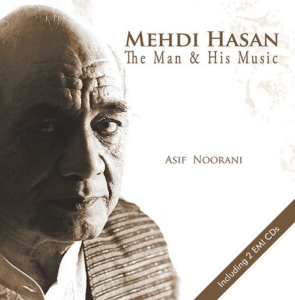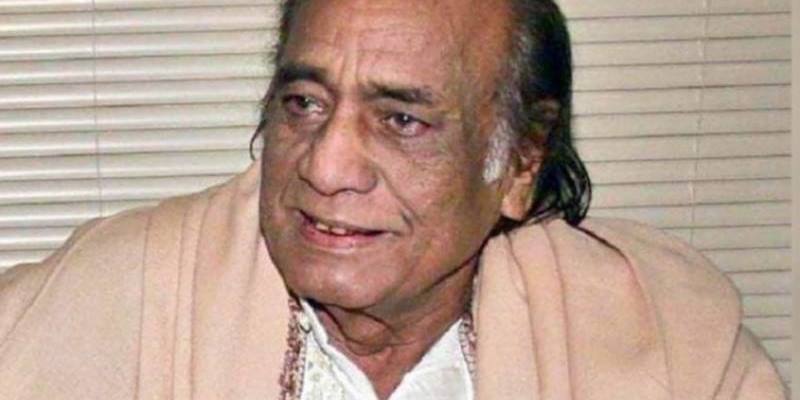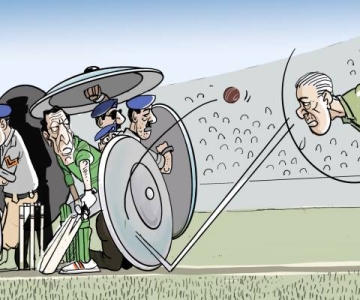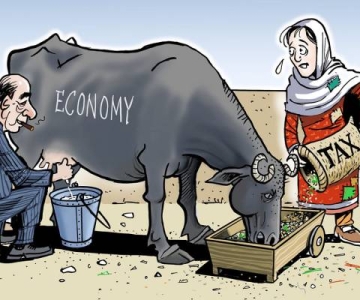A book review published in DAWN mentions my piece on Mehdi Hasan:
… Raza Rumi’s piece ‘The Melodious Age of Mehdi Hasan’ discusses in reasonable detail the socio-cultural impact that Khan Sahib has had on Pakistani society.
Beginning from his birth (in the town of Luna in district Jhunjhunu, Rajasthan in 1927) he touches upon the early struggling phase of his life and then, in lyrical prose, talks about the society that he is a part of and how music in particular and the arts in general are looked upon.
He writes, “Our greatest artists, singers, poets and intellectuals have suffered at the hands of a conformist society and state captured by puritans especially since the late ’70s.
It is never too late for the intelligentsia of this country to mobilise public pressure on the state machinery so that it learns to respect cultural diversity and the imperative to nurture a creative, healthy and civilised society.”
Showering compliments on Khan Sahib, Raza Rumi rounds off his article by claiming, “Miyan Tansen must be proud of his new age prodigy.”
Here’s the full review:
THERE are some individuals for whom epithets and hyperboles never seem to lose their usefulness. Mehdi Hasan is a legend. He is a class act; a master singer. Someone who has taught other vocalists how to sing the genre of ghazal in a manner that it merits, and without making it sound something which only has literary value.
We all know that Khan Sahib, as he is known amongst friends and family, hasn’t been well for quite a few years and can barely speak. Music lovers from all across the world are praying for his recovery.
It is sad that there aren’t many books that have captured or recounted either Mehdi Hasan’s art or his life. Those that are available in the market do not fully satiate the appetite that his fans (who are in large numbers) have for knowing his personal and professional journey thus far.
In that context journalist Asif Noorani has done a commendable job by coming out with the book Mehdi Hasan: The man and his music, which is a compilation of different articles and short pieces written especially for the book on the great man.
To boot, the book is accompanied by two CDs (EMI Pakistan partnered on the project) that contain some of the most memorable ghazals and songs sung by Khan Sahib. In his foreword to the book, Asif Noorani extends his gratitude to EMI for giving a new ‘look’ to some of the ‘old priceless recordings’.
It doesn’t happen very often that luminaries from the world of broadcast journalism, print medium and showbiz pen their personal or professional experience about an individual. Mehdi Hasan: The man and his music begins with Raza Ali Abidi’s account, titled ‘A Stickler For Perfection’, of the legendary singer in which he highlights not only his remarkable vocal ability but also the modesty that has almost become the middle name of the remarkable singer. Raza Ali Abidi, as we all know, is a known broadcaster who had been associated with the BBC Urdu Service for a long time.
Anwar Enayetullah’s tribute ‘Down Melody Lane’, originally published in the Urdu weekly Nigar in 1992, primarily discusses the technical mastery that the singer has over his art.
He argues that Mehdi Hasan never indulged in ‘guttural gymnastics’ because he had a ‘highly flexible voice’.
Journalist Raza Rumi’s piece ‘The Melodious Age of Mehdi Hasan’ discusses in reasonable detail the socio-cultural impact that Khan Sahib has had on Pakistani society.
Beginning from his birth (in the town of Luna in district Jhunjhunu, Rajasthan in 1927) he touches upon the early struggling phase of his life and then, in lyrical prose, talks about the society that he is a part of and how music in particular and the arts in general are looked upon.
He writes, “Our greatest artists, singers, poets and intellectuals have suffered at the hands of a conformist society and state captured by puritans especially since the late ’70s.
It is never too late for the intelligentsia of this country to mobilise public pressure on the state machinery so that it learns to respect cultural diversity and the imperative to nurture a creative, healthy and civilised society.”
Showering compliments on Khan Sahib, Raza Rumi rounds off his article by claiming, “Miyan Tansen must be proud of his new age prodigy.”
Sultan Arshad and Asif Noorani’s write-ups (‘Playback Singer Par Excellence’ and ‘Never a Discordant Note’) nicely entail some of the private (peppered with anecdotes) aspects of the legend’s life with useful background information on the origin of some of his greatest songs and ghazals.
While Rakhshanda Jalil’s tribute (‘Shola Sa Lapak Jaye Hai…’) aptly describes how Mehdi Hasan has been instrumental in popularising the genre of Urdu ghazal in India. Kishore Bhimani’s article on, and Rishad Mahmood’s interview of, the Shahanshah-i-Ghazal are also worth going through.
Those of you who are wondering what his colleagues and people belonging to showbiz have to say about the vocalist, there’s a chapter titled ‘Reminiscences’ in which comments of the glitterati from the realm of the arts like Javed Akhtar, Dilip Kumar, the late Naushad, the late Noor Jehan, Abida Parveen, Jagjit Singh, Runa Laila, Nayyara Noor, Lata Mangeshkar, Tina Sani, Robin Ghosh and Nadeem are included.
Another noteworthy feature of the book is the lovely pictures of Mehdi Hasan, solo as well as with many renowned names of showbiz. Taking a look at them brings back memories of the days when the world of showbiz had more substance than style.

Mehdi Hasan: The man and his music
(ESSAYS)
Written and Edited by Asif Noorani
Liberty Books, Karachi
ISBN 978-969-950200-2
80pp. Rs695



